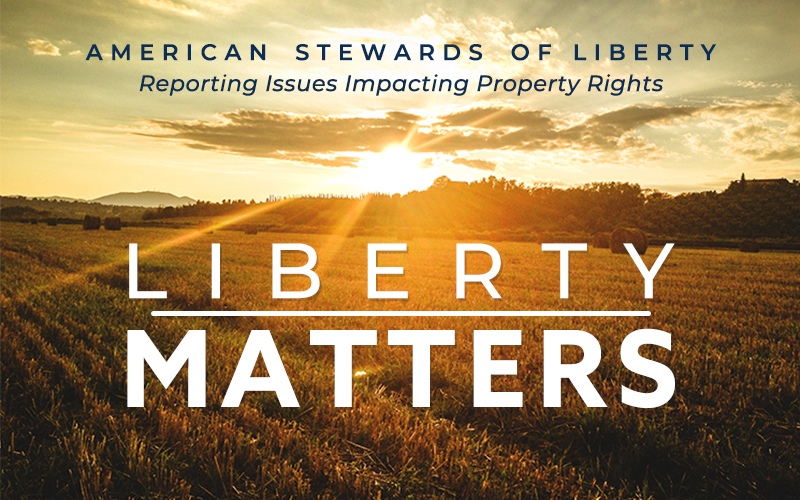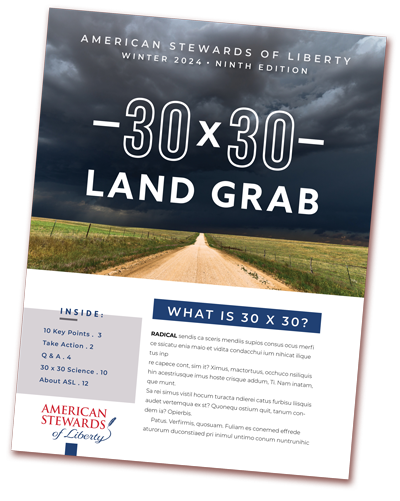ASL has been contacted by the states of Tennessee, Kansas, and Texas about state legislation being sought for conservation purposes. We are certain other states have similar legislation and suggest you contact your state legislators to find what “conservation” legislation is pending.
The controversy stems not only from all the money being freely distributed, but from the new language altering the farm programs under the 2018 Farm Bill. Programs such as the Conservation Reserve Program (CRP), Environmental Quality Incentive Program (EQIP), and the Agriculture Conservation Easement Program (ACEP).
In the past, under the current language of the 2018 Farm Bill, these programs were designed to help farmers and ranchers, providing government assistance with practical and specific incentives to manage their land in sound and proven methods. However, with the language change provided in the Inflation Reduction Act, that all changed.
Now, these trusted program’s purposes have dramatically been altered to mitigate and address climate change through reducing cow flatulence, greenhouse gas emissions, and controlling agricultural production. All to address the supposed climate crisis caused by agriculture.
State Legislation
One of the key changes made by the IRA was to the ACEP federal conservation easement program funded by the USDA-NRCS. The original purpose for the easements were to “protect the agricultural use and future viability, and … protect grazing uses and related conservation values by restoring or conserving eligible land.”
Under the new IRA language, the name stayed the same, but the purpose fundamentally changed. Now instead of “protecting agriculture,” the new requirement is to “prioritize projects and activities that mitigate or address climate change through the management of agricultural production, including by reducing or avoiding greenhouse gas emissions.”
Proponents of this language believe Agriculture is causing climate change; therefore, agriculture production needs to be controlled to mitigate the crisis, hence the reason for this new language. To sell the agenda they packaged it up with lofty sounding names like “climate smart programs.”
For land trusts, states, and landowners to access these funds for ACEP, they must secure matching grants, in this case 50% of the costs. For other federal conservation easement programs like the Forest Legacy Program, the federal government provides 75% of the funds requiring a 25% matching grant.
Environmentalists realize they cannot access this windfall from the IRA, nor get effective control of agriculture production on private lands without the required matching funds. Their solution has been to get states to write the check.
Texas
In Texas, Representative Justin Holland from the Dallas area, introduced HB 3165,
creating a $2 billion slush fund from Texas’ Rainy-Day Funds (tax-payer money) to acquire farm, ranch, and forest lands in Texas.
The money was to be pooled into the “Land and Water Conservation Fund” and run by a board consisting of members from the Texas General Land Office, the Texas Parks and Wildlife Department, the Texas Commission on Environmental Quality, and the Texas Water Development Board. The purpose of the Land and Water Conservation Fund was to grant millions of dollars to environmental organizations and land trusts to buy conservation easements. Texas would have become a state encumbered by easements that delegated management authority to an NGO or a state agency.
HB 3165 passed out of the House but was killed in the Senate when we convinced the Senate sponsor to withdraw the bill.
Kansas
In Kansas, HB 2541 creates the “Working Lands Conservation Fund” to “promote conservation…through irrigation efficiency, grazing rotation and management, soil health practices,” and others.
ASL provided testimony that was given to the House Agricultural and Natural Resources Committee chairman prior to the hearing on January 22nd.
In our testimony, we stated HB 2541 was very practical and appropriate, but it also included “long-term land protection from conversion or loss of habitat, biodiversity, sustainable and regenerative timber management, and ecological restoration.”
These “terms” set off alarms because of the combination of the Biden administration’s attempt to lock up 30 percent of our nation’s lands and waters by 2030 and the passage of the Inflation Reduction Act. Those two devices combined directly affect the consequences HB 2541 will have on the private property of Kansas landowners.
The bill’s language prioritizes the “capture” of “federal, private or other nonstate matching moneys” to purchase conservation easements. It also specifically states in Sec. 2, (e) “nonprofit entities shall be eligible to receive funding from the grant program” giving them government grants to place as many conservation easements on private property as possible.
During the hearing on the 22nd, so many landowners appeared in protest that the chairman of the House Committee on Agriculture and Natural Resources said he would not let a vote occur on the bill. Time will tell, but for now, HB 2541 has been stopped.
Tennessee
In Tennessee, HB 1890, by Representative Lamberth, specifically creates the “Farmland Preservation Fund” to allow Tennessee’s Commissioner of Agriculture to acquire “agricultural easements” that “imposes limitations or affirmative obligations on the owner of the servient estate, the owner’s heir, and assigns with respect to the use and management of the servient land, structures or features thereon…”
Without specifically saying “conservation easements” in the bill, it in fact defines the term utilizing the keyword “servient.” Under a conservation easement, the landowner conveys his development rights to a third party, normally a land trust, and legally he becomes the “servient” owner of the land. The land trust becomes the “dominant” owner because he owns control of how the land will be used – known as the “conservation purpose.”
We were told by a state representative that he was assured the bill would not see the light of day in the House, but there is a Senate companion, SB 2099, By Sen. Johnson, that just passed on Wednesday on “First Consideration.” It’s clear that the Senate version will be the vehicle landowners need to watch and stop, if possible.
Stop 30×30 in Your State
All these states and pieces of legislation are chasing the federal dollars now being doled out by the Inflation Reduction Act. Everyone needs to research their state legislation to see what “conservation” legislation has been filed.
Few are aware the language of the IRA changed the purpose for these programs. However, by taking the federal dollars under the IRA, states will unwittingly be assisting the Biden administration’s 30×30 program in prioritizing the control of agriculture production instead of truly helping farmers and ranchers.
We have three good resources for you to learn more and stop this agenda in your state:





